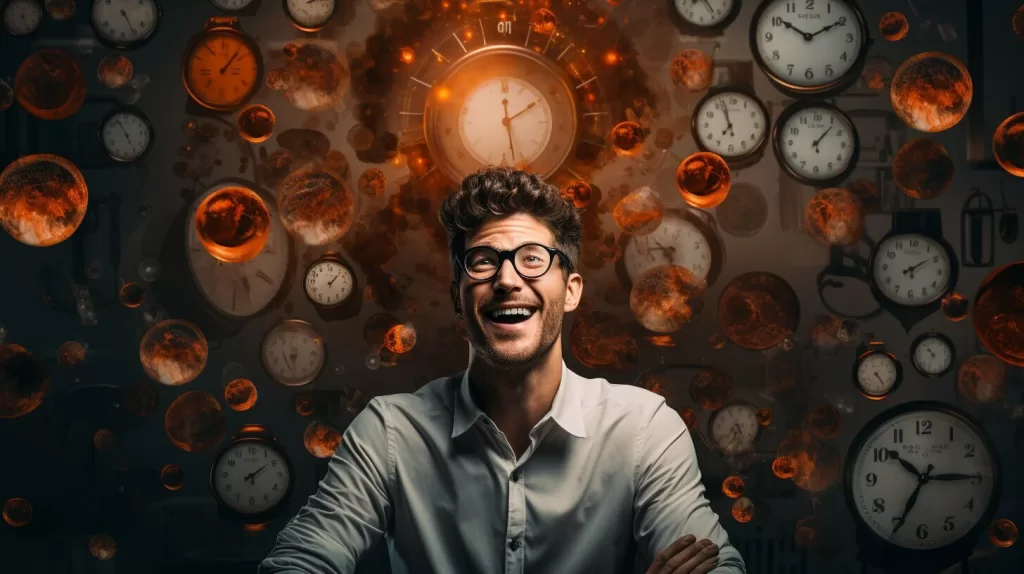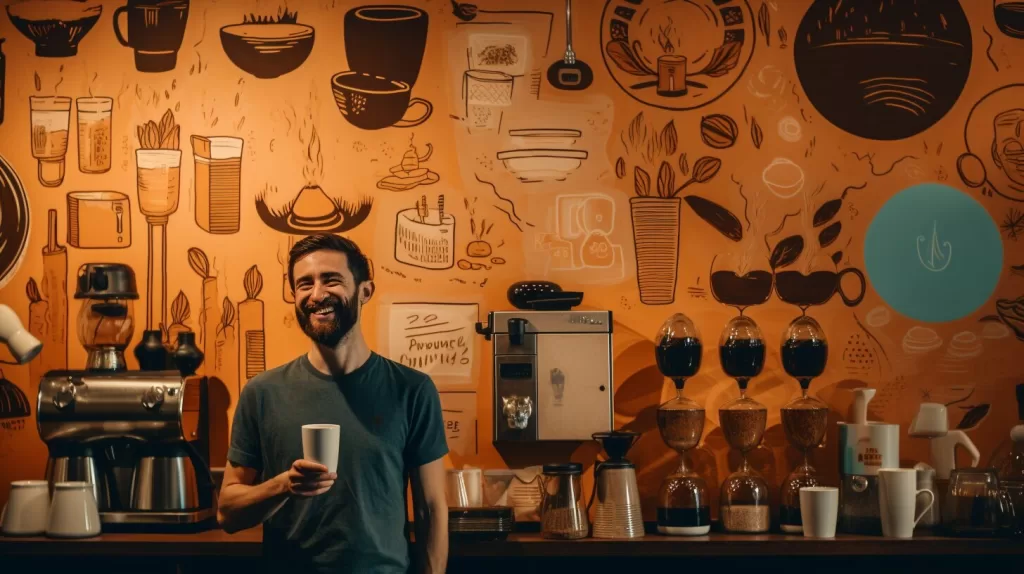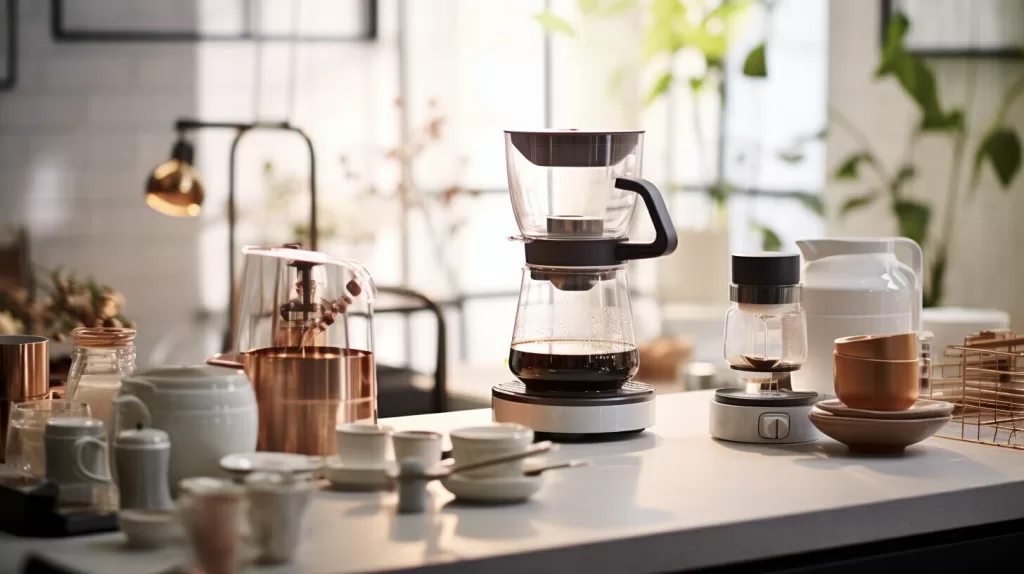Are you tired of inconsistent coffee brews that never seem to satisfy your taste buds? The secret to brewing the perfect cup lies in the timing of the brewing process. Understanding the role of coffee brewing time in the extraction process is key to unlocking the full potential of your coffee beans.
In this section, we will explore the crucial role of coffee brewing time in achieving the perfect cup of coffee. By the end of this article, you will be able to determine the ideal brewing time based on your taste preferences, and learn how to fine-tune your brewing process to ensure consistently exceptional results. Let’s dive in and discover the secrets to mastering the art of timing in coffee brewing.
Key Takeaways:
- Timing is a crucial factor in the coffee brewing process.
- Understanding coffee extraction science helps in determining the optimal brewing time.
- Different brewing times result in varying flavor profiles.
- Maximizing extraction time can lead to a stronger flavor profile.
- Smoothness is a desirable trait in coffee, and brewing time plays a significant role in achieving it.
The Science Behind Coffee Extraction
Have you ever wondered how long to brew coffee for optimal flavor? It all comes down to the science behind coffee extraction. Extraction is the process of dissolving the desirable compounds from the coffee beans into the water.
Factors that affect coffee extraction include the grind size, water temperature, and the desired flavor profile. A finer grind size, for example, can result in a stronger and more flavorful coffee, while a coarser grind may produce a lighter and smoother taste.
The water temperature also plays a significant role in extraction. Water that is too cold may under-extract the coffee, resulting in a weak and bland taste. On the other hand, water that is too hot may over-extract the coffee, causing a bitter and unpleasant taste.
To determine the optimal brewing time for your coffee, consider your desired flavor profile. A shorter brewing time may result in a brighter and more acidic taste, while a longer brewing time can produce a fuller and richer flavor.
The Science Behind Coffee Extraction
| Factor | Impact on Extraction |
|---|---|
| Grind Size | Affects surface area and brew time |
| Water Temperature | Affects extraction rate |
| Flavor Profile | Determines optimal brewing time |
Experiment with your coffee brewing process to find the optimal brewing time for your taste preferences. Start with a standard brewing time of 4-5 minutes and adjust from there based on the flavor and strength of your coffee.
Remember, the science behind coffee extraction is just one part of the equation. Fine-tune your brewing process by considering other factors such as water quality and coffee-to-water ratio, and you’ll be well on your way to brewing the perfect cup of coffee every time.
Finding Your Perfect Flavor Balance
When it comes to coffee, taste is subjective. Whether you prefer a fruity and bright cup or a rich and chocolatey one, the ideal brewing time for you will depend on your individual flavor preferences.
Experimentation is key when it comes to finding the perfect brewing time for your taste. Start by brewing a cup of coffee for the recommended time for your chosen brewing method, then taste it and adjust accordingly. If the taste is too weak for your liking, brew it for longer next time. If it’s too strong or bitter, brew it for a shorter time.
Keep in mind that different types of coffee beans and blends may also require different brewing times to achieve the perfect flavor balance. Lighter roasts may need less time to brew to retain their delicate flavors, while darker roasts may require a longer brewing time to extract their bold and robust notes.
Ultimately, the ideal coffee brewing time for best flavor is the one that results in a cup of coffee that you personally enjoy. Don’t be afraid to experiment and tweak your brewing time to find that perfect balance of flavors that satisfies your taste buds.
Maximizing Extraction for Strength
If you prefer a bold and intense cup of coffee, the brewing time is crucial in achieving maximum extraction. Extraction refers to the process of extracting flavor and aroma from the coffee grounds, and the longer the coffee is brewed, the more extraction occurs.
The optimal coffee brewing time for maximum extraction will depend on various factors, including the desired strength of your coffee, the type of coffee beans, and the brewing method.
To brew strong coffee, you need to increase the extraction time without making the coffee bitter or unpleasant. A common mistake is using too fine of a grind, which can over-extract the coffee and result in a bitter taste. It’s essential to find the right balance between brewing time and grind size.
The ideal coffee brewing time for strong coffee is typically between 4 and 5 minutes, depending on the brewing method and the type of coffee bean. During this time, the water will extract the maximum amount of flavor while minimizing bitterness.
Another way to maximize extraction is by using a higher coffee-to-water ratio, which can result in a stronger and more robust cup of coffee. Aim for a ratio of 1:15 or 1:16 for a strong cup of coffee.
Keep in mind that the coffee brewing time for maximum extraction will vary depending on your taste preferences. Experiment with different brewing times and ratios until you find the perfect balance for your ideal cup of coffee.
Striving for Smoothness in Each Sip
When it comes to coffee, a smooth taste is often what many coffee lovers strive for. The brewing time plays a significant role in achieving this desirable trait. But what does “smooth” mean in terms of coffee flavor? Simply put, it refers to a balanced taste without any pronounced bitterness or acidity.
The ideal coffee brewing time for a smooth taste can vary depending on the type of coffee bean and your personal preferences. Generally, a shorter brewing time can result in a smoother taste, as it extracts fewer bitter compounds from the grounds. However, if you prefer a stronger flavor profile, a longer brewing time may be necessary.
It’s also essential to consider the water temperature and the grind size when aiming for a smooth taste. Water that’s too hot can extract unwanted bitterness, while a fine grind may result in over-extraction and added bitterness.
There are various brewing methods that can help achieve a velvety, smooth taste, such as the pour-over and the AeroPress. These methods allow for precise control over the brewing variables, resulting in a perfectly balanced cup of coffee.
Experiment with different brewing times and techniques to find your ideal brewing time for a smooth taste. With a little practice and some patience, you can unlock the full potential of your coffee beans and enjoy a deliciously smooth cup of coffee every time.
Eliminating Common Brewing Time Mistakes
Making mistakes in coffee brewing time is easy, but they can result in a less-than-perfect cup. Avoid these common mistakes and brew like a pro:
- Using the wrong grind size: A finer grind requires a shorter brewing time, while a coarser grind needs a longer time.
- Not paying attention to water temperature: Use the right temperature for maximum extraction. Water that is too hot can produce a bitter taste, while water that is too cold can result in a weak brew.
- Using stale coffee beans: Old beans can affect the flavor of the coffee. Always use freshly roasted beans for the best flavor.
- Over-extracting: Leaving the coffee in contact with the water for too long can result in a bitter taste. Pay attention to the optimal brewing time.
- Under-extracting: Not leaving the coffee in contact with the water long enough can result in a weak brew. Ensure you give the coffee enough time to extract fully.
By avoiding these common mistakes, you can improve the quality of your coffee and get the most out of your brewing time.
Experimenting with Different Brewing Techniques
Coffee brewing is an adventure that allows for endless experimentation. Trying out different brewing techniques is an excellent way to expand your coffee horizons and discover new flavors and aromas. Each brewing method has unique characteristics that can significantly impact the brewing time and overall taste of your coffee.
One popular brewing method is the pour-over, which involves pouring hot water over ground coffee in a filter placed over a carafe or mug. The pour-over method allows for precise control of the water flow rate, which can impact the brewing time and strength of the coffee.
Another technique is the French press, which uses a plunger to separate the brewed coffee from the grounds. The French press method typically requires a longer brewing time than other methods, resulting in a bold and rich flavor profile.
Espresso, another popular brewing method, uses high pressure to extract flavor from finely ground coffee. The brewing time for espresso is typically much shorter than other methods, resulting in a highly concentrated and intense cup of coffee.
Other brewing techniques to explore include cold brew, Aeropress, and Moka pot. Each method has its unique brewing time and can produce distinct flavor profiles. Experiment with different techniques to find the one that suits your taste preferences best.
Fine-tuning Your Brewing Process
While mastering the perfect coffee brewing time is key, there are other factors that can enhance your coffee experience. Consider the following tips to fine-tune your brewing process:
- Water Quality: Your coffee is 98% water, so make sure you use high-quality filtered water for the best taste.
- Coffee-to-Water Ratio: The ratio of coffee to water can affect the strength and flavor of your coffee. A general rule of thumb is to use about 1 to 2 tablespoons of coffee for every 6 ounces of water.
- Grind Size: Different brewing methods require different grind sizes. For example, a French press calls for a coarser grind, while a traditional drip coffee maker requires a finer grind.
- Brewing Equipment: Your brewing equipment can also impact the taste of your coffee. Consider investing in a quality coffee maker or grinder to enhance your coffee experience.
- Brewing Temperature: The ideal brewing temperature is between 195-205°F. If your water is too hot, it can result in a bitter taste, while water that is too cold can lead to under-extraction.
By fine-tuning these factors, you can elevate your coffee brewing process to the next level. Experiment with different variables to find the perfect combination for your taste preferences.
Conclusion
In conclusion, mastering the perfect cup of coffee involves understanding the crucial role of brewing time. Finding the ideal coffee brewing time is a balance between the desired flavor profile and strength. Through understanding the science behind coffee extraction, experimenting with different brewing techniques, and fine-tuning your process, you can achieve the perfect cup of coffee every time.
Elevate Your Daily Coffee Ritual
Elevate your daily coffee ritual by focusing on the perfect coffee brewing time. It is the secret to unlocking the full potential of your coffee beans and achieving the perfect balance of flavors. And remember, small mistakes can quickly affect the quality of your cup, so take the time to experiment and fine-tune your process. With the knowledge and tips provided in this article, you can confidently master the art of timing and brew the best cup of coffee every time.
So, start your day with a perfectly brewed cup of coffee by finding your ideal coffee brewing time. From smooth and velvety to bold and intense, experiment with different times and techniques to find your perfect flavor balance. With dedication and persistence, you can achieve the perfect coffee brewing time and enjoy the ultimate coffee experience.
Thank you for joining us on this journey to master the perfect cup of coffee. We hope you found this article helpful and informative. Happy brewing!
Keywords: perfect coffee brewing time
FAQ
What is the role of coffee brewing time in achieving the perfect cup?
Coffee brewing time is crucial in unlocking the full potential of your coffee beans. It determines the flavor, strength, and smoothness of your cup of coffee.
How does the science behind coffee extraction affect brewing time?
Understanding the science behind coffee extraction helps determine the optimal brewing time. Factors like grind size, water temperature, and desired flavor profile impact how long you should brew your coffee for the best results.
How can I find my ideal flavor balance through brewing time?
Experimenting with different brewing times allows you to discover your preferred flavor balance. By adjusting the brewing time, you can tailor the flavors to your taste preferences.
What is the optimal brewing time for a stronger cup of coffee?
If you enjoy a stronger coffee, maximizing extraction through a longer brewing time is key. This technique extracts more flavor compounds and results in a bolder cup of coffee.
How does brewing time affect the smoothness of coffee?
Brewing time can impact the acidity, bitterness, and overall smoothness of coffee. Finding the right brewing time helps achieve a velvety, smooth taste in your cup.
What are some common brewing time mistakes to avoid?
Some common brewing time mistakes include over- or under-extraction, improper water temperature, and inconsistent timing. Avoid these pitfalls to ensure consistently great coffee.
What are different brewing techniques that can affect brewing time?
Various brewing techniques like pour-over and French press can influence the brewing time. Experimenting with different techniques allows you to explore new flavors and adjust the brewing time accordingly.
How can I fine-tune my brewing process beyond just timing?
In addition to timing, factors like water quality, coffee-to-water ratio, and equipment can impact the brewing process. Fine-tune these elements to achieve consistently exceptional results.
What is the secret to brewing the perfect cup of coffee?
The secret lies in finding the ideal brewing time that suits your preferences. Experiment, learn from the science, and fine-tune your process to achieve the perfect balance of flavors in every cup.



